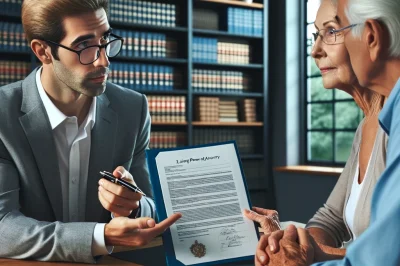Table of Contents

A Lasting Power of Attorney (LPA) is a legal document that allows you to appoint someone you trust to make decisions on your behalf if you become unable to do so in the future.
In the UK, there are generally two types of LPA that you can create, each with different purposes:
- Property and Financial Affairs LPA: This type of LPA allows you to appoint an attorney to make decisions about your finances, such as managing your bank accounts, paying bills, collecting your benefits or pension, selling your property, or making investments on your behalf. This type of LPA can come into effect either while you still have capacity or after you lose capacity.
- Health and Welfare LPA: This type of LPA allows you to appoint an attorney to make decisions about your health and personal welfare if you are unable to do so. This may include decisions about where you live, what medical treatment you receive, and who can visit you. This type of LPA can only come into effect after you lose capacity.
- Ideally you should create both types of LPAs, and it is recommended to do so to ensure that your interests are protected comprehensively.
Mistakes When Taking out an LPA
However, there are some common mistakes which people often make when it comes to taking out an LPS. Swansea Legal Solutions is often called in to help with people who have tried to take out an LPA themselves but have made some basic mistakes as follows:
- It’s essential to make an LPA while you still have the mental capacity to do so. If you wait too long and lose mental capacity, you won’t be able to create an LPA, and your loved ones will have to apply to the Court of Protection which is a more complicated and costly process.
- Choosing the right person to be your attorney is critical. It would be best if you picked someone you trust to act in your best interests, someone who understands your wishes and values, and someone who is capable of handling the responsibility.
- You need to understand that the authority given to your attorneys can be broad or narrow, depending on your instructions. It’s important to ensure that your attorneys know what you want and have clear instructions about how you want them to act on your behalf.
- Your circumstances and wishes may change over time, and it’s essential to review your LPA regularly to ensure that it still reflects your wishes and is up-to-date.
- In summary, taking out a Lasting Power of Attorney can be a useful tool for protecting your interests if you lose mental capacity in the future. However, to avoid common mistakes, it’s important to create an LPA while you still have mental capacity, choose the right person to act as your attorney, understand the authority given to your attorneys, seek professional advice, and update your LPA regularly.
Swansea Legal Solutions
LPAs can be complex legal documents, and it’s crucial to seek professional advice to ensure that the document is valid, properly executed, and reflects your wishes. The team at Swansea Legal Solutions can help with all aspects of LPA’s for both financial and health and welfare circumstance. You can read more about our services on our website or call a member of our team to book an appointment on 01792 402844.
- Grant of Probate vs Letters of Administration: What’s the Difference? – 26 February 2026
- When Should You Use a Probate Solicitor? A UK Guide for Executors – 23 February 2026
- Probate and Property: What Happens to a House After Death in the UK? – 21 February 2026







Leave a Reply
You must be logged in to post a comment.